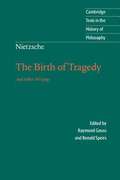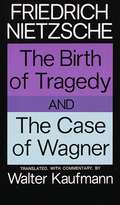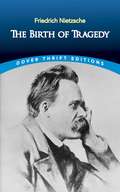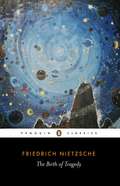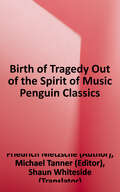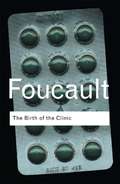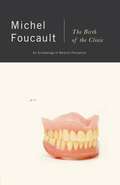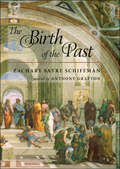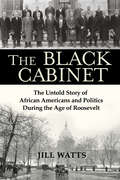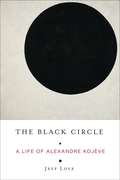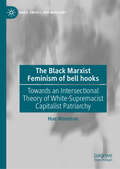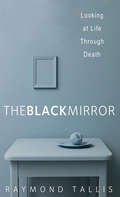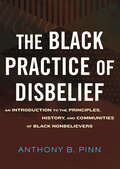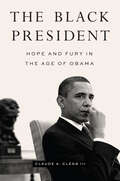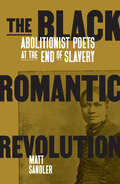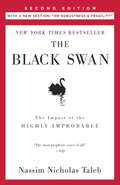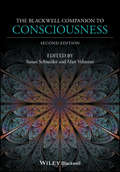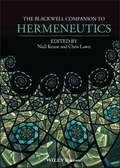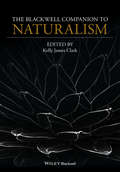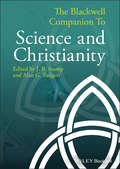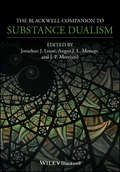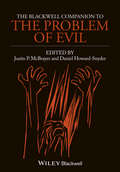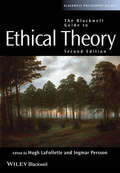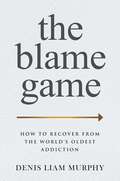- Table View
- List View
The Birth of Tragedy and Other Writings: Cambridge texts in the History of Philosophy
by Friedrich NietzscheNietzsche's discussion of the nature of culture, of the conditions under which it can flourish and of those under which it will decline, his analysis of the sources of discontent with the modern world, his criticism of rationalism and of traditional morality, his aesthetic theories and his conception of the 'Dionysiac' have had a profound influence on the philosophy, literature, music, and politics of the twentieth century.
The Birth of Tragedy and the Case of Wagner
by Friedrich NietzscheThe Birth of Tragedy (1872) was Nietzsche's first book. Its youthful faults were exposed by Nietzsche in the brilliant "Attempt at a Self-Criticism" which he added to the new edition of 1886. But the book, whatever its excesses, remains one of the most relevant statements on tragedy ever penned. It exploded the conception of Greek culture that was prevalent down through the Victorian era, and it sounded themes developed in the twentieth century by classicists, existentialists, psychoanalysts, and others. The Case of Wagner (1888) was one Nietzsche's last books, and his wittiest. In attitude and style it is diametrically opposed to The Birth of Tragedy. Both works transcend their ostensible subjects and deal with art and culture, as well as the problems of the modern age generally. Each book in itself gives us an inadequate idea of its author; together, they furnish a striking image of Nietzsche's thought. The distinguished new translations by Walter Kaufmann superbly reflect in English Nietzsche's idiom and the vitality of his style. Professor Kaufmann has also furnished running footnote commentaries, relevant passages from Nietzsche's correspondence, a bibliography, and, for the first time in any edition, an extensive index to each book.
The Birth of Tragedy: Out Of The Spirit Of Music (Dover Thrift Editions)
by Friedrich NietzscheAmong the most influential philosophers of modern times, Friedrich Nietzsche (1844-1900) declared in this classic study that Greek tragedy achieved greatness through a fusion of elements of Apollonian restraint and control with Dionysian components of passion and the irrational. In Nietzsche's eyes, however, Greek tragedy had been destroyed by the rationalism and optimism of thinkers like Socrates. Nevertheless, he found in these ancient works the life-affirming concept that existence is still beautiful, however grim and depressing it may sometimes be. These and many other ideas are argued with passionate conviction in this challenging book, called by British classicist F. M. Cornford "a work of profound imaginative insight, which left the scholarship of a generation toiling in the rear."
The Birth of Tragedy: Out of the Spirit of Music
by Friedrich NietzscheNietzsche's first published book, The Birth of Tragedy is a compelling argument for the necessity of art in lifeThis landmark work of criticism is fuelled by Nietzsche's enthusiasms for Greek tragedy, the philosophy of Schopenhauer and the music of Wagner, to whom the book was dedicated. Nietzsche outlined a distinction between two central forces in art: the Apolline, representing beauty and order, and the Dionysiac, a primal or ecstatic reaction to the sublime. He believed the combination of these states produced the highest forms of music and tragic drama, which not only reveal the truth about suffering in life, but also provide a consolation for it. Impassioned and exhilarating in its conviction, The Birth of Tragedy has become a key text in European culture.Translated by Shaun WhitesideEdited by Michael Tanner
The Birth of Tragedy: Out of the Spirit of Music
by Friedrich NietzscheA compelling argument for the necessity for art in life, Nietzsche's first book is fuelled by his enthusiasm for Greek tragedy, for the philosophy of Schopenhauer and for the music of Wagner, to whom this work was dedicated. Nietzsche outlined a distinction between its two central forces- the Apolline, representing beauty and order, and the Dionysiac, a primal or ecstatic reaction to the sublime. He believed the combination of these states produced the highest forms of music and tragic drama, which not only reveal the truth about suffering in life, but also provide a consolation for it. Impassioned and exhilarating in its conviction, The Birth of Tragedy has become a key text in European culture and in literary criticism.
The Birth of the Clinic: An Archaeology Of Medical Perception (Routledge Classics)
by Michel FoucaultIn this remarkable book Michel Foucault, one of the most influential thinkers of recent times, calls us to look critically at specific historical events in order to uncover new layers of significance. In doing so, he challenges our assumptions not only about history, but also about the nature of language and reason, even of truth. The scope of such an undertaking is vast, but by means of his uniquely engaging narrative style, Foucault’s penetrating gaze is skilfully able to confront our own. After reading his words our perceptions are never quite the same again.
The Birth of the Clinic: Archaeology of Medical Perception
by Michel Foucault A. M. Sheridan SmithIn the eighteenth century, medicine underwent a mutation. For the first time, medical knowledge took on a precision that had formerly belonged only to mathematics. The body became something that could be mapped. Disease became subject to new rules of classification. And doctors begin to describe phenomena that for centuries had remained below the threshold of the visible and expressible. In The Birth of the Clinic the philosopher and intellectual historian who may be the true heir to Nietzsche charts this dramatic transformation of medical knowledge. As in his classic Madness and Civilization, Michel Foucault shows how much what we think of as pure science owes to social and cultural attitudes -- in this case, to the climate of the French Revolution. Brilliant, provocative, and omnivorously learned, his book sheds new light on the origins of our current notions of health and sickness, life and death.
The Birth of the Past
by Zachary S. SchiffmanHow we learned to distinguish past from present and see the world historically.Outstanding Academic Title, ChoiceHow did people learn to distinguish between past and present? How did they come to see the past as existing in its own distinctive context? In The Birth of the Past, Zachary Sayre Schiffman explores these questions in his sweeping survey of historical thinking in the Western world. Today we automatically distinguish between past and present, labeling things that appear out of place as "anachronisms." Schiffman shows how this tendency did not always exist and how the past as such was born of a perceived difference between past and present. Schiffman takes readers on a grand tour of historical thinking from antiquity to modernity. He shows how ancient historians could not distinguish between past and present because they conceived of multiple pasts. Christian theologians coalesced these multiple pasts into a single temporal space where past merged with present and future. Renaissance humanists began to disentangle these temporal states in their desire to resurrect classical culture, creating a "living past." French enlighteners killed off this living past when they engendered a form of social scientific thinking that measured the relations between historical entities, thus sustaining the distance between past and present and relegating each culture to its own distinctive context.Featuring a foreword by the eminent historian Anthony Grafton, this fascinating book draws upon a diverse range of sources—ancient histories, medieval theology, Renaissance art, literature, legal thought, and early modern mathematics and social science—to uncover the meaning of the past and its relationship to the present.
The Black Box Society: The Secret Algorithms That Control Money And Information
by Frank PasqualeEvery day, corporations are connecting the dots about our personal behavior-silently scrutinizing clues left behind by our work habits and Internet use. The data compiled and portraits created are incredibly detailed, to the point of being invasive. But who connects the dots about what firms are doing with this information? The Black Box Society argues that we all need to be able to do so-and to set limits on how big data affects our lives. Hidden algorithms can make (or ruin) reputations, decide the destiny of entrepreneurs, or even devastate an entire economy. Shrouded in secrecy and complexity, decisions at major Silicon Valley and Wall Street firms were long assumed to be neutral and technical. But leaks, whistleblowers, and legal disputes have shed new light on automated judgment. Self-serving and reckless behavior is surprisingly common, and easy to hide in code protected by legal and real secrecy. Even after billions of dollars of fines have been levied, underfunded regulators may have only scratched the surface of this troubling behavior. Frank Pasquale exposes how powerful interests abuse secrecy for profit and explains ways to rein them in. Demanding transparency is only the first step. An intelligible society would assure that key decisions of its most important firms are fair, nondiscriminatory, and open to criticism. Silicon Valley and Wall Street need to accept as much accountability as they impose on others.
The Black Cabinet: The Untold Story of African Americans and Politics During the Age of Roosevelt
by Jill WattsAn in-depth history exploring the evolution, impact, and ultimate demise of what was known in the 1930s and ‘40s as FDR’s Black Cabinet.In 1932 in the midst of the Great Depression, Franklin Delano Roosevelt won the presidency with the help of key African American defectors from the Republican Party. At the time, most African Americans lived in poverty, denied citizenship rights and terrorized by white violence. As the New Deal began, a “black Brain Trust” joined the administration and began documenting and addressing the economic hardship and systemic inequalities African Americans faced. They became known as the Black Cabinet, but the environment they faced was reluctant, often hostile, to change.“Will the New Deal be a square deal for the Negro?” The black press wondered. The Black Cabinet set out to devise solutions to the widespread exclusion of black people from its programs, whether by inventing tools to measure discrimination or by calling attention to the administration’s failures. Led by Mary McLeod Bethune, an educator and friend of Eleanor Roosevelt, they were instrumental to Roosevelt’s continued success with black voters. Operating mostly behind the scenes, they helped push Roosevelt to sign an executive order that outlawed discrimination in the defense industry. They saw victories?jobs and collective agriculture programs that lifted many from poverty?and defeats?the bulldozing of black neighborhoods to build public housing reserved only for whites; Roosevelt’s refusal to get behind federal anti-lynching legislation. The Black Cabinet never won official recognition from the president, and with his death, it disappeared from view. But it had changed history. Eventually, one of its members would go on to be the first African American Cabinet secretary; another, the first African American federal judge and mentor to Thurgood Marshall.Masterfully researched and dramatically told, The Black Cabinet brings to life a forgotten generation of leaders who fought post-Reconstruction racial apartheid and whose work served as a bridge that Civil Rights activists traveled to achieve the victories of the 1950s and ’60s.Praise for The Black Cabinet“A dramatic piece of nonfiction that recovers the history of a generation of leaders that helped create the environment for the civil rights battles in decades that followed Roosevelt’s death.” —Library Journal“Fascinating . . . revealing the hidden figures of a ‘brain trust’ that lobbied, hectored and strong-armed President Franklin Roosevelt to cut African Americans in on the New Deal. . . . Meticulously researched and elegantly written, The Black Cabinet is sprawling and epic, and Watts deftly re-creates whole scenes from archival material.” —Minneapolis Star Tribune
The Black Circle: A Life of Alexandre Kojève
by Jeff LoveAlexandre Kojève (1902–1968) was an important and provocative thinker. Born in Russia, he spent most of his life in France. His interpretation of Hegel and his notorious declaration that history had come to an end exerted great influence on French thinkers and writers such as Raymond Aron, Georges Bataille, Maurice Merleau-Ponty, Jacques Lacan, and Raymond Queneau. An unorthodox Marxist, he was a critic of Martin Heidegger and interlocutor of Leo Strauss who played a significant role in establishing the European Economic Community; a polyglot with many unusual interests, he wrote works, mostly unpublished in his lifetime, on quantum physics, the problem of the infinite, Buddhism, atheism, and Vassily Kandinsky’s paintings.In The Black Circle, Jeff Love reinterprets Kojève’s works, showing him to be an essential thinker who challenged modern society and its valuation of individuality, self-interest, and freedom from death. Emphasizing Kojève’s neglected Russian roots, The Black Circle puts him in the context of the late-nineteenth- and early-twentieth-century Russian debates over the proper ends of human life. Love explores notions of perfection, freedom, and finality in Kojève’s account of Hegel and his neglected later works, clarifying Kojève’s emancipatory thinking and the meaning of the oft-misinterpreted “end of history.” Combining intellectual history, close textual analysis, and philosophy, The Black Circle reveals Kojève’s thought as a profound critique of capitalist individualism and a timely meditation on human freedom.
The Black Marxist Feminism of bell hooks: Towards an Intersectional Theory of White-Supremacist Capitalist Patriarchy (Marx, Engels, and Marxisms)
by Hue WoodsonThis book explores bell hooks' trajectory of work and cohesiveness of thought about the meaning and meaningfulness of black womanhood in terms of a Black Marxist feminism, which uniquely confronts the dimensions of feminism and womanism; the relations between the secular and the religious; the problems of gender and sexism; and the structural and systemic issues of oppression, domination, white supremacy, and capitalism. In making sense of black womanhood in its philosophical, social, cultural, institutional, and historical complexities, hooks' Black Marxist feminism constructs an intersectional theory about what hooks describes as white supremacist capitalist patriarchy. In this sense, hooks' Black Marxist feminism conceptualizes the ways and means by which white supremacist capitalist patriarchy imposes intersectional predicaments upon black womanhood, drawing foundationally on Karl Marx and Fredrich Engels, working within the purview of a host of Marxisms in Antonio Gramsci, Louis Althusser, Karl Kautsky, Nikolai Bukharin, and Georgi Plekhanov, and speaking to the Marxist proclivities of Cedric Robinson, Cornel West, Charles W. Mills, James H. Cone, Stuart Hall, and Angela Y. Davis.
The Black Mirror
by Raymond TallisIn this beautifully written personal meditation on life and living, Raymond Tallis reflects on the fundamental fact of existence: that it is finite. Inspired by E. M. Forster's thought that "Death destroys a man but the idea of it saves him," Tallis invites readers to look back on their lives from a unique standpoint: one's own future corpse. From this perspective, he shows, the world now vacated can be seen most clearly in all its richness and complexity. Tallis blends lyrical reflection, humor, and the occasional philosophical argument as he explores his own postmortem recollections. He considers the biological processes and the senses that opened up his late world and the million-nooked space in which he passed his life. His inert, dispossessed body highlights his ceaseless activity in life, the mind-boggling inventory of his possessions, and the togetherness and apartness that characterized his relationships in the material and social worlds. Tallis also touches on the idea of a posthumous life in the memories of those who outlive him. Readers who accompany Tallis as he considers his life through death will appreciate with new intensity the precariousness and preciousness of life, for here he succeeds in his endeavor to make "the shining hour" shine more brightly.
The Black Practice of Disbelief: An Introduction to the Principles, History, and Communities of Black Nonbelievers
by Anthony PinnA short introduction to Black Humanism: its history, its present, and the rich cultural sensibilities that infuse itIn the United States, to be a Black American is to be a Black Christian. And there&’s something to this assumption in that the vast majority of African Americans are Christian. However, in recent years a growing number of African Americans have said they claim no particular religious affiliation—they are Black "nones." And of these Black "nones," the most public and vocal are those who claim to be humanists.What does it mean to be a Black humanist? What do Black humanist believe, and what do they do? This slim volume answers these questions. Animated by six central principles, and discussed in terms of its history, practices, formations, and community rituals, this book argues that Black humanism can be understood as a religious movement. Pinn makes a distinction between theism and religion—which is simply a tool for examining, naming, and finding the meaning in human experience. Black humanism, based on this definition isn&’t theistic but it is a religious system used to explore human experience and foster life meaning. It infuses humanism with rich cultural sensibilities drawn from Black experience. As shown in these pages, thinking about Black humanism this way frees readers from making unfounded assumptions and enables them to better appreciate the secular &“beliefs,&” ritual structures, and community formation constituted by Black humanists.
The Black President: Hope and Fury in the Age of Obama
by Claude A. Clegg IIIThe first sweeping, legacy-defining history of the entire Obama presidency.In The Black President, the first interpretative, grand-narrative history of Barack Obama's presidency in its entirety, Claude A. Clegg III situates the former president in his dynamic, inspirational, yet contentious political context. He captures the America that made Obama's White House years possible, while insightfully rendering the America that resolutely resisted the idea of a Black chief executive, thus making conceivable the ascent of the most unlikely of his successors. In elucidating the Obama moment in American politics and culture, this book is also, at its core, a sweeping exploration of the Obama presidency's historical environment, impact, and meaning for African Americans—the tens of millions of people from every walk of life who collectively were his staunchest group of supporters and who most starkly experienced both the euphoric triumphs and dispiriting shortcomings of his years in office. In Obama's own words, his White House years were "the best of times and worst of times" for Black America. Clegg is vitally concerned with the veracity of this claim, along with how Obama engaged the aspirations, struggles, and disappointments of his most loyal constituency and how representative segments of Black America engaged, experienced, and interpreted his historic presidency. Clegg draws on an expansive archive of materials, including government records and reports, interviews, speeches, memoirs, and insider accounts, in order to examine Obama's complicated upbringing and early political ambitions, his delicate navigation of matters of race, the nature and impacts of his administration's policies and politics, the inspired but also carefully choreographed symbolism of his presidency (and Michelle Obama's role), and the spectrum of allies and enemies that he made along the way. The successes and the aspirations of the Obama era, Clegg argues, are explicitly connected to our current racist, toxic political discourse. Combining lively prose with a balanced, nonpartisan portrait of Obama's successes and failures, The Black President will be required reading not only for historians, politics junkies, and Obama fans but also for anyone seeking to understand America's contemporary struggles with inequality, prejudice, and fear.
The Black Romantic Revolution: Abolitionist Poets at the End of Slavery
by Matt SandlerThe prophetic poetry of slavery and its abolitionDuring the pitched battle over slavery in the United States, Black writers—enslaved and free—allied themselves with the cause of abolition and used their art to advocate for emancipation and to envision the end of slavery as a world-historical moment of possibility. These Black writers borrowed from the European tradition of Romanticism—lyric poetry, prophetic visions--to write, speak, and sing their hopes for what freedom might mean. At the same time, they voiced anxieties about the expansion of global capital and US imperial power in the aftermath of slavery. They also focused on the ramifications of slavery's sexual violence. Authors like Frances Ellen Watkins Harper, George Moses Horton, Albery Allson Whitman, and Joshua McCarter Simpson conceived the Civil War as a revolutionary upheaval on par with Europe's stormy Age of Revolutions. The Black Romantic Revolution proposes that the Black Romantics' cultural innovations have shaped Black radical culture to this day, from the blues and hip hop to Black nationalism and Black feminism. Their expressions of love and rage, grief and determination, dreams and nightmares, still echo into our present.
The Black Swan: The Impact of the Highly Improbable Fragility" (Incerto #2)
by Nassim Nicholas TalebA black swan is a highly improbable event with three principal characteristics: It is unpredictable; it carries a massive impact; and, after the fact, we concoct an explanation that makes it appear less random, and more predictable, than it was. The astonishing success of Google was a black swan; so was 9/11. For Nassim Nicholas Taleb, black swans underlie almost everything about our world, from the rise of religions to events in our own personal lives. Why do we not acknowledge the phenomenon of black swans until after they occur? Part of the answer, according to Taleb, is that humans are hardwired to learn specifics when they should be focused on generalities. We concentrate on things we already know and time and time again fail to take into consideration what we don't know. We are, therefore, unable to truly estimate opportunities, too vulnerable to the impulse to simplify, narrate, and categorize, and not open enough to rewarding those who can imagine the "impossible." For years, Taleb has studied how we fool ourselves into thinking we know more than we actually do. We restrict our thinking to the irrelevant and inconsequential, while large events continue to surprise us and shape our world. Now, in this revelatory book, Taleb explains everything we know about what we don't know. He offers surprisingly simple tricks for dealing with black swans and benefiting from them.Elegant, startling, and universal in its applications The Black Swan will change the way you look at the world. Taleb is a vastly entertaining writer, with wit, irreverence, and unusual stories to tell. He has a polymathic command of subjects ranging from cognitive science to business to probability theory. The Black Swan is a landmark book--itself a black swan. *2nd Edition, with a new essay: "On Robustness and Fragility".
The Blackwell Companion to Consciousness
by Susan Schneider Max VelmansUpdated and revised, the highly-anticipated second edition of The Blackwell Companion to Consciousness offers a collection of readings that together represent the most thorough and comprehensive survey of the nature of consciousness available today. Features updates to scientific chapters reflecting the latest research in the field Includes 18 new theoretical, empirical, and methodological chapters covering integrated information theory, renewed interest in panpsychism, and more Covers a wide array of topics that include the origins and extent of consciousness, various consciousness experiences such as meditation and drug-induced states, and the neuroscience of consciousness Presents 54 peer-reviewed chapters written by leading experts in the study of consciousness, from across a variety of academic disciplines
The Blackwell Companion to Hermeneutics
by Niall Keane Chris LawnA Companion to Hermeneutics is a collection of original essays from leading international scholars that provide a definitive historical and critical compendium of philosophical hermeneutics. Offers a definitive historical, systematic, and critical compendium of hermeneutics Represents state-of-the-art thinking on the major themes, topics, concepts and figures of the hermeneutic tradition in philosophy and those who have influenced hermeneutic thought, including Kant, Hegel, Schleiermacher Dilthey, Heidegger, Gadamer, Ricoeur, Foucault, Habermas, and Rorty Explores the art and theory of interpretation as it intersects with a number of philosophical and inter-disciplinary areas, including humanism, theology, literature, politics, education and law Features contributions from an international cast of leading and upcoming scholars, who offer historically informed, philosophically comprehensive, and critically astute contributions in their individual fields of expertise Written to be accessible to interested non-specialists, as well asprofessional philosophers
The Blackwell Companion to Naturalism
by Kelly James ClarkThe Blackwell Companion to Naturalism provides a systematic introduction to philosophical naturalism and its relation to other schools of thought. Features contributions from an international array of established and emerging scholars from across the humanities Explores the historical development of naturalism and its ascension to the dominant orthodoxy in the Western academy Juxtaposes theoretical criticisms with impassioned defenses, encapsulating contemporary debates on naturalism Includes discussions of metaphysics, realism, feminism, science, knowledge, truth, mathematics, free will, and ethics viewed through a naturalist lens
The Blackwell Companion to Science and Christianity
by Alan G. Padgett J. B. StumpA cutting-edge survey of contemporary thought at the intersection of science and Christianity.Provides a cutting-edge survey of the central ideas at play at the intersection of science and Christianity through 54 original articles by world-leading scholars and rising stars in the discipline Focuses on Christianity's interaction with Science to offer a fine-grained analysis of issues such as multiverse theories in cosmology, convergence in evolution, Intelligent Design, natural theology, human consciousness, artificial intelligence, free will, miracles, and the Trinity, amongst many othersAddresses major historical developments in the relationship between science and Christianity, including Christian patristics, the scientific revolution, the reception of Darwin, and twentieth century fundamentalismDivided into 9 Parts: Historical Episodes; Methodology; Natural Theology; Cosmology & Physics; Evolution; The Human Sciences; Christian Bioethics; Metaphysical Implications; The Mind; Theology; and Significant Figures of the 20th CenturyIncludes diverse perspectives and broadens the conversation from the Anglocentric tradition
The Blackwell Companion to Substance Dualism (Blackwell Companions to Philosophy)
by J. P. Moreland Jonathan J. Loose Angus J. MenugeA groundbreaking collection of contemporary essays from leading international scholars that provides a balanced and expert account of the resurgent debate about substance dualism and its physicalist alternatives. Substance dualism has for some time been dismissed as an archaic and defeated position in philosophy of mind, but in recent years, the topic has experienced a resurgence of scholarly interest and has been restored to contemporary prominence by a growing minority of philosophers prepared to interrogate the core principles upon which past objections and misunderstandings rest. As the first book of its kind to bring together a collection of contemporary writing from top proponents and critics in a pro-contra format, The Blackwell Companion to Substance Dualism captures this ongoing dialogue and sets the stage for rigorous and lively discourse around dualist and physicalist accounts of human persons in philosophy. Chapters explore emergent, Thomistic, Cartesian, and other forms of substance dualism—broadly conceived—in dialogue with leading varieties of physicalism, including animalism, non-reductive physicalism, and constitution theory. Loose, Menuge, and Moreland pair essays from dualist advocates with astute criticism from physicalist opponents and vice versa, highlighting points of contrast for readers in thematic sections while showcasing today’s leading minds engaged in direct debate. Taken together, essays provide nuanced paths of introduction for students, and capture the imagination of professional philosophers looking to expand their understanding of the subject. Skillfully curated and in touch with contemporary science as well as analytic theology, The Blackwell Companion to Substance Dualism strikes a measured balanced between advocacy and criticism, and is a first-rate resource for researchers, scholars, and students of philosophy, theology, and neuroscience.
The Blackwell Companion to The Problem of Evil
by Justin P. Mcbrayer Daniel Howard-SnyderThe Blackwell Companion to the Problem of Evil presents a collection of original essays providing both overview and insight, clarifying and evaluating the philosophical and theological "problem of evil" in its various contexts and manifestations.Features all original essays that explore the various forms of the problems of evil, offering theistic responses that attempt to explain evil as well as discussion of the challenges facing such explanationsIncludes section introductions with a historical essay that traces the developments of the issues exploredAcknowledges the fact that there are many problems of evil, some of which apply only to those who believe in concepts such as hell and some of which apply to non-theistsRepresents views from the various religious traditions, including Hindu, Jewish, Christian, and Muslim
The Blackwell Guide to Ethical Theory
by Hugh Lafollette Ingmar PerssonBuilding on the strengths of the highly successful first edition, the extensively updated Blackwell Guide to Ethical Theory presents a complete state-of-the-art survey, written by an international team of leading moral philosophers. A new edition of this successful and highly regarded Guide, now reorganized and updated with the addition of significant new materialIncludes 21 essays written by an international team of leading philosophersExtensive, substantive essays develop the main arguments of all the leading viewpoints in ethical theoryEssays new to this edition cover evolution and ethics, capability ethics, virtues and consequences, and the implausibility of virtue ethics
The Blame Game: How to Recover from the World's Oldest Addiction
by Denis Liam MurphyHonest happiness and effortless living are possible. You just have to heal from a blame addiction you didn&’t know you had.Life is designed to be effortless. It might not seem like it right now, but a deep sense of confidence, freedom, and serenity is attainable regardless of your situation. All you need to do is address ONE habit. One that you didn&’t know you had. Anxiety, depression, anger, shame, and guilt are all symptoms of your blame addiction. Spend a month on the BLAME recovery process. Within 30 days… YOUR MENTAL HEALTH WILL IMPROVE. YOUR PHYSICAL PERFORMANCE WILL BE ENHANCED. YOUR ENERGY LEVELS WILL INCREASE. YOUR LIFE WILL CHANGE. From the very first chapter of The Blame Game, you will not only start to release years of built-up frustration, resentment, and sadness, you will begin to find out who you honestly are—all so you can find out what your true purpose is.
